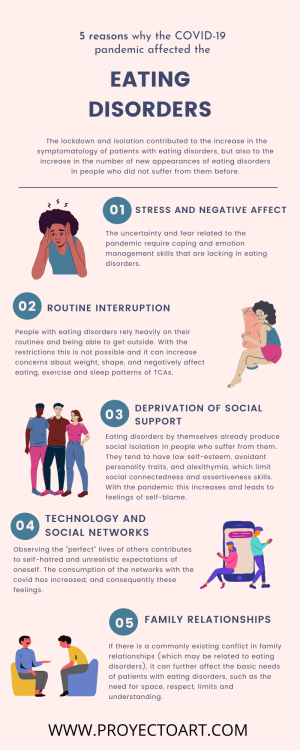Wednesday 26/1/2022
PHOTO: Artem Labunsky
Text: Alejandra Misiolek
Eating disorders, such as anorexia, bulimia or binge eating disorder, are psychiatric problems related to both eating behavior, which we see on the surface, and difficulties in mentalizing, emotional management, low self-esteem, problems with identity and difficulties in relating to others, which are underneath.
The COVID pandemic is not over, however we can already start drawing conclusions that might contribute to a better understanding of possible triggers and aggravators and further help develop improved treatments.
Has the pandemic affected Eating Disorders?
In a pilot study at the Eating Disorders Unit of the Department of Psychiatry, at the University Hospital of Bellvitge (Barcelona, Spain), the investigators carried out a survey to monitor the impact of the first two weeks of lockdown and they concluded that most of the patients presented worries about increased uncertainties in their lives. Almost 38% reported impairments in their ED symptomatology and 56.2% reported additional anxiety symptoms that also triggered emotional eating.
Other studies that assessed the impact of the long-term effects of the pandemic on ED also confirm that the lockdown and isolation contributed to the increase in the symptomatology of patients with ED but also to the increased number of appearances of ED in people that did not suffer from them before.
How and why?
- First, the most obvious trigger, also shared by other psychiatric disorders, are elevated rates of stress and negative affect caused by the pandemic. The uncertainty of the future, fear of getting sick, fear of death, adaptation to a new situation, etc. require coping skills and emotion management that are missing in ED.
- Secondly, patients with eating disorders and especially with anorexia, depend very much on their daily routines and it is difficult for them to be flexible. The disruptions to daily routines and constraints to outdoor activities surely increased weight and shape concerns, and negatively impacted eating, exercise, and sleeping patterns, which may in turn increase ED risk and symptoms.
- Relatedly, the pandemic and accompanying social restrictions deprived individuals of social support and adaptive coping strategies of regulating affect through relationships. While the social distancing contributes to social isolation and loneliness, many people with eating disorders already have impoverished relationships as a result of various interpersonal difficulties. They tend to have low self-esteem, avoidant personality traits, and alexithymia, which limit social connectivity and assertive skills. These patients are normally self-conscious and distressed by their impaired social skills, which leads to self-blame and body image issues that contribute to the ED. Therefore, it is crucial to remember that the eating disorder can become a companion for some, and the maladaptive behaviors provide a temporary form of relief from internalized distress.
- Moreover, there is technology. On the one hand, an increased exposure to ED-specific or anxiety-provoking media increased distress, and on the other, social relationships were transformed into video conferencing and increased dependence on social media. The triggering role of social media for people with eating disorders has been widely described and discussed, where observing the “perfect” lives of others contributes to self-deprecation and unrealistic expectation about oneself. In addition to that, the constant bombardment of social media posts and messages about ‘inevitable’ weight gain related to staying at home did not help either.
- Finally, there is family and a commonly existing conflict in familial relationships that may be related to the disrupted eating patterns. The enforced confinement may further strain the family dynamic that affects negatively the crucial needs of an eating disordered patients such as the need for space, respect, limits and understanding.
What can we learn? How can we improve?
The pandemic can be seen as a natural experiment that besides taking a huge toll, can also teach us something. The described reasons for which the pandemic exacerbated eating disorders emphasizes the importance of certain triggers and therefore, areas to take care of, for people who suffer from anorexia, bulimia or a binge eating disorder.
As eating disorders are understood as problems with emotional processing and management, external stressors that cause strong emotions, may contribute to altering eating habits. But most of all, eating disorders are related to important difficulties in relating to others in a healthy way that might offer support and help to process emotions and these difficulties normally have their roots in complicated family relationships. Families where the personal limits are not respected, expectations and control are very high and abilities to take care of oneself not developed, are very typical family patterns in patients with ED.
Therefore, isolation from support groups, difficulties in securely relying on others, using social media to connect and feeling stuck at home with the family, in case of adolescents, are among the most important risk factors for aggravating an Eating Disorder.

Sources:
